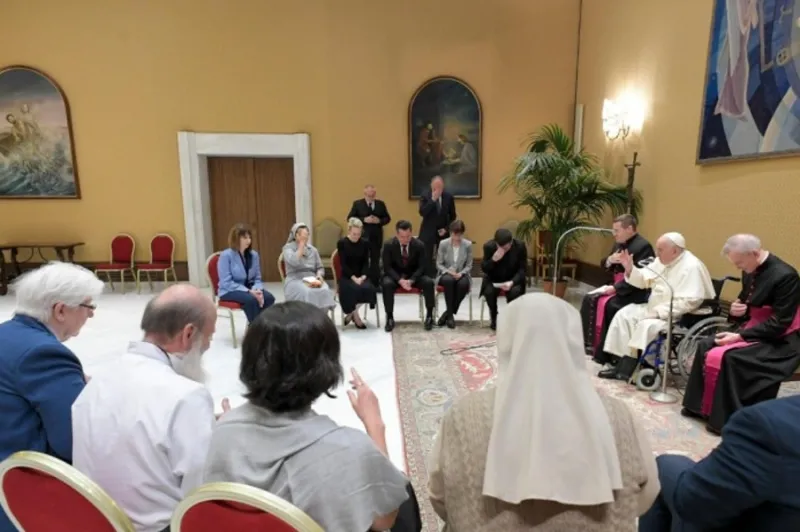 Pope Francis meets members of the Global Solidarity Fund in a room adjacent to the Vatican’s Paul VI Hall, May 25, 2022. / Vatican Media.
Pope Francis meets members of the Global Solidarity Fund in a room adjacent to the Vatican’s Paul VI Hall, May 25, 2022. / Vatican Media.
Vatican City, May 25, 2022 / 06:40 am (CNA).
Pope Francis on Wednesday called for the creation of a “new kind” of economy based on Christian values and community, not communism or the Enlightenment.
Speaking to members of the Global Solidarity Fund at the Vatican on May 25, the pope urged the creation of an economy in support of the people.
“Look also for a new kind of economy,” he said. “The economy must be converted, it must be converted now. We have to convert from the liberal economy to the economy shared by people, the community economy.”
In off-the-cuff comments, Francis said: “We cannot live with a pattern of economics that comes from liberals and the Enlightenment. Nor can we live with a pattern of economics that comes from communism. We need … a Christian economy, let’s say. Look for the new expressions of the economy of this time.”
In this area, the pope praised the progress of young economists, especially women, naming the Italian-American economist Mariana Mazzucato.
The Global Solidarity Fund is a network helping to connect development groups, philanthropists, and investors with marginalized people around the world, including migrants.
Pope Francis said he liked it when people went to the peripheries to help others, “simply because Jesus went to the peripheries: He went there to show them the Gospel.”
“The peripheries, be they of the body, be they of the soul; because there are people who are somewhat well off but their souls are broken, torn: go with them too; [there are] so many people who need closeness,” he said.
In brief written remarks, which the pope handed out at the meeting, he focused on the concept of “solidarity.”
“It is one of the core values of the Church’s social doctrine,” he said. “But to become concrete it must be accompanied with closeness and compassion toward the other, the marginalized person, toward the face of the poor, the migrant.”